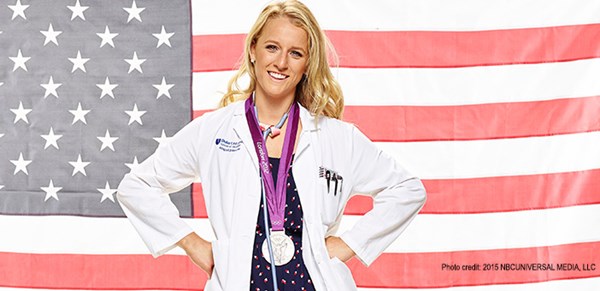Medical students often set aside favorite non-medical activities in order to succeed in coursework, exams, research, board preparation, etc. As I took a break from studying this summer to watch the 2016 Rio Olympics, a diver from the United States walked up to the board. Her name was Abby Johnston, and the announcer began to explain that Abby is not just any Olympic diver – she is also a third-year medical student at Duke University School of Medicine, planning to pursue emergency medicine. Abby is proof there is always time in medical school (and residency) to continue the activities we enjoy outside of medicine. I spoke with her about the ways in which she balances medical school with her passion for diving.
When did you start diving, and what do you enjoy most about it?
I started when I was 13. I was a gymnast for many years but had to stop due to a back injury. Diving felt like a close substitution because I was able to flip and twist but it wasn't as tough on my body to land in water.
Did you know coming into medical school that you wanted to try to return to diving at the Olympic level?
After the 2012 Olympic Games, my motivation to return to the sport was a roller coaster ride. Initially, I was dying to go back for another Games. However, I didn't want to put off medical school in order to train. Then I had shoulder surgery and thought that maybe I'd become a washed-up has-been. During my gap year, I started training again and thought, "Would it be insane if I did medical school while I train for Rio?" And the answer in hindsight is that yes, it was absolutely insane, but I don't regret any of the sacrifices I made or one minute of the time I spent training.
How were you able to train for the Olympics while attending medical school?
I trained twice a day, six days a week. I'd practice from 6:30-8 am, go to lab/class, return to practice for another 2 hours in the afternoon, go home to study, and then wake up and repeat. When pressed for time, it's incredible how productive one can be. I watched lectures on the treadmill, answered conference calls about research while I was out of the country for a competition, and flipped through pharm flashcards while walking between the pool and the medical school. I wasn't a total robot, though; I made time for the other things in my life that I love, like watching my fiance coach at Duke football games, drinking wine with friends, and talking to my crazy family every day.
What are the similarities between fellow Olympic athletes and fellow medical students? What are the differences?
Medical students and Olympians are similar because both are willing to make large sacrifices and commit a tremendous amount of time to master a skill/profession. Also, both wake up at absurdly early hours. As far as differences, I'd say medical students are more likely to sit in the front row of a lecture.
What interests you most about emergency medicine?
I like high-pressure situations (shocker, right?). I love that every day in the emergency department is something different and the profound impact you can have on very sick patients. Also, wearing scrubs is like wearing comfy workout clothes, and who wouldn't want to wear that every day?
What is one thing that people should know about you?
My family calls me a “mathlete” because I've always been nerdy and loved math and science classes. I also love Harry Potter, and I took some magic classes as a kid. Still waiting for my Hogwarts acceptance letter...
What advice would you give to other medical students who want to balance medical school studies with extracurricular activities?
You need something that's a break from medicine to keep your sanity. For me, being an athlete makes me a better student and being a student makes me a better athlete. Make time for things you love and you'll be a happier, more rounded person. Also, never press snooze. I always set everything out that I'll need for the next day the night before, set my alarm for as late as possible, and hit the ground running when my alarm goes off in the morning.
Now that you have retired from diving, what do you hope to do with your newfound "free time"?
I haven't officially retired, but I'm taking a long hiatus to focus on my clinical rotations. I finally have more time to take weekend trips, plan my wedding, and watch reality TV. One of my favorite things to do is what I like to call "sloth Sunday," where I virtually only move from the couch to the kitchen all day and binge-watch TV. I finally have more time to indulge in this way.
You say you haven't officially retired, so I have to ask - are you considering returning to the 2020 Summer Olympics?
Possibly. I'm planning to reevaluate my interest in returning at the end of this year. Diving has been such a huge part of my life, and I'm not sure what life without it will be like. So, I'm giving myself the chance to explore that this year, with the possibility of returning for Tokyo 2020.



